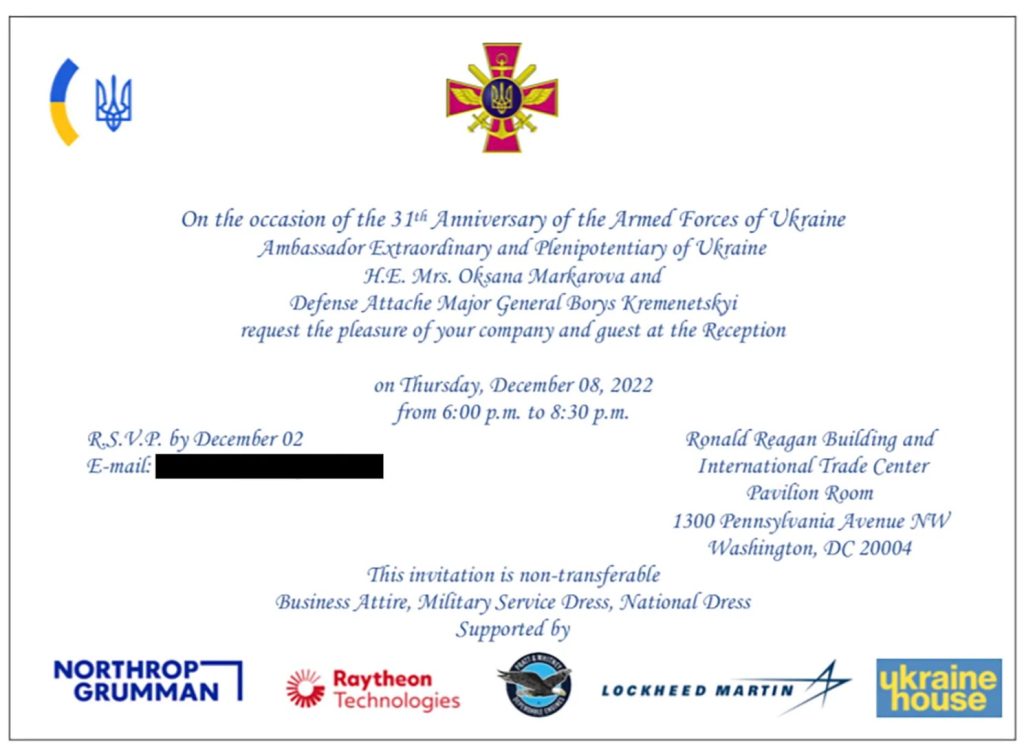This is shameless!

The Ukrainian Embassy hosted a reception last week in honor of the 31st anniversary of the country’s armed services. Events like this are part of the social calendar of Washington’s smart set, with hobnobbing diplomats, think tankers, journalists, and US officials. Guests took photos with the Ukrainian ambassador. Even Chairman of the Joint Chiefs of Staff Mark Milley showed up.
But there was something so overt it led some observers to laugh out loud at the gathering’s invitation.
The logos of military contractors wNorthrop Grumman, Raytheon, Pratt & Whitney, and Lockheed Martinere emblazoned on the invitation as the event’s sponsors, below the official Ukrainian emblems and elegant blue script that said the Ukrainian ambassador and defense attaché “request the pleasure of your company.”
“It’s really bizarre to me that they would put that on an invitation,” one think tank expert told me. “The fact that they don’t feel sheepish about it, that’s interesting,” explained an academic. (Both spoke on the condition of anonymity and regularly attend embassy events in Washington.)
That Ukraine and those US military contractors have a strong relationship isn’t surprising. America’s allies and partners around the world bought some $50 billion in US weapons last year. These four companies produce some of the most high-profile missile defense systems and anti-tank missiles that President Joe Biden has sent to Ukraine since Russian President Vladimir Putin invaded in February. Neither is it surprising that Ukraine’s government, which says its country has already suffered hundreds of billions of dollars in damage, might not want to deplete its coffers.
But the explicit sponsorship indicates how intimate major military contractors have become with Ukraine, and how much they stand to gain from the war.
The invitation is a clear expression of how the war in Ukraine has been good for business. As Ukraine fights a defensive war against Russia’s brutal invasion, Ukrainians in Washington have been pushing for the US to send Ukraine more weapons. So far, President Joe Biden’s administration has committed a substantial $19.3 billion of military assistance since February.
No one wanted to talk about the party invite, however. A senior official from the Ukrainian Embassy in Washington confirmed that the companies’ logos appeared on the invitation but declined to speak on the record. They directed me to the Ukrainian Ministry of Defense, which did not immediately respond. Lockheed declined to officially comment and deferred to Ukraine House, an embassy-linked entity that was also listed on the invitation. Raytheon also declined to comment. Emails to Northrop Grumman and Pratt & Whitney were not returned.
Even some US supporters of Ukraine say the overt sponsorship is a bad look. “Sustaining American popular support is absolutely essential for Ukraine’s continued defense,” Matt Duss, a Carnegie Endowment for International Peace fellow who previously advised Sen. Bernie Sanders, told me. “So Ukrainian diplomats should probably think harder about how it looks for them to be throwing parties with the defense contractors who are making bank off of this horrible war.”
It’s a big club and you ain’t in it… [Vox]














The “fake christian” is you 50k. Christians (disciples) don’t cuss and bully people I think, except people like you. I work for God, not for man.
Smellinsky is haunting Congress, probably banging out a sad song on the piano with his pecker. $45,000,000,000 is not enough money, he says. Bitch McClownhead thinks the number one priority for Republicans is to feed the khazarian mafia laundromat. Merry Christmas from all the pedosatanist traitors fraudulently elected and ruining America. Watch ’em all burn in hell.
Military-Industrial Complex Speech, Dwight D. Eisenhower, 1961
My Fellow Americans:
Three days from now, after half a century in the service of our country, I shall lay down the responsibilities of office as, in traditional and solemn ceremony, the authority of the Presidency is vested in my successor.
This evening I come to you with a message of leave-taking and farewell, and to share a few final thoughts with you, my countrymen.
Like every other citizen, I wish the new President, and all who will labor with him, Godspeed. I pray that the coming years will be blessed with peace and prosperity for all.
Our people expect their President and the Congress to find essential agreement on issues of great moment, the wise resolution of which will better shape the future of the Nation.
My own relations with the Congress, which began on a remote and tenuous basis when, long ago, a member of the Senate appointed me to West Point, have since ranged to the intimate during the war and immediate post-war period, and, finally, to the mutually interdependent during these past eight years.
In this final relationship, the Congress and the Administration have, on most vital issues, cooperated well, to serve the national good rather than mere partisanship, and so have assured that the business of the Nation should go forward. So, my official relationship with the Congress ends in a feeling, on my part, of gratitude that we have been able to do so much together.
II.
We now stand ten years past the midpoint of a century that has witnessed four major wars among great nations. Three of these involved our own country. Despite these holocausts America is today the strongest, the most influential and most productive nation in the world. Understandably proud of this pre-eminence, we yet realize that America’s leadership and prestige depend, not merely upon our unmatched material progress, riches and military strength, but on how we use our power in the interests of world peace and human betterment.
III.
Throughout America’s adventure in free government, our basic purposes have been to keep the peace; to foster progress in human achievement, and to enhance liberty, dignity and integrity among people and among nations. To strive for less would be unworthy of a free and religious people. Any failure traceable to arrogance, or our lack of comprehension or readiness to sacrifice would inflict upon us grievous hurt both at home and abroad.
Progress toward these noble goals is persistently threatened by the conflict now engulfing the world. It commands our whole attention, absorbs our very beings. We face a hostile ideology — global in scope, atheistic in character, ruthless in purpose, and insidious in method. Unhappily the danger is poses promises to be of indefinite duration. To meet it successfully, there is called for, not so much the emotional and transitory sacrifices of crisis, but rather those which enable us to carry forward steadily, surely, and without complaint the burdens of a prolonged and complex struggle — with liberty the stake. Only thus shall we remain, despite every provocation, on our charted course toward permanent peace and human betterment.
Crises there will continue to be. In meeting them, whether foreign or domestic, great or small, there is a recurring temptation to feel that some spectacular and costly action could become the miraculous solution to all current difficulties. A huge increase in newer elements of our defense; development of unrealistic programs to cure every ill in agriculture; a dramatic expansion in basic and applied research — these and many other possibilities, each possibly promising in itself, may be suggested as the only way to the road we wish to travel.
But each proposal must be weighed in the light of a broader consideration: the need to maintain balance in and among national programs — balance between the private and the public economy, balance between cost and hoped for advantage — balance between the clearly necessary and the comfortably desirable; balance between our essential requirements as a nation and the duties imposed by the nation upon the individual; balance between actions of the moment and the national welfare of the future. Good judgment seeks balance and progress; lack of it eventually finds imbalance and frustration.
The record of many decades stands as proof that our people and their government have, in the main, understood these truths and have responded to them well, in the face of stress and threat. But threats, new in kind or degree, constantly arise. I mention two only.
IV.
A vital element in keeping the peace is our military establishment. Our arms must be mighty, ready for instant action, so that no potential aggressor may be tempted to risk his own destruction.
Our military organization today bears little relation to that known by any of my predecessors in peacetime, or indeed by the fighting men of World War II or Korea.
Until the latest of our world conflicts, the United States had no armaments industry. American makers of plowshares could, with time and as required, make swords as well. But now we can no longer risk emergency improvisation of national defense; we have been compelled to create a permanent armaments industry of vast proportions. Added to this, three and a half million men and women are directly engaged in the defense establishment. We annually spend on military security more than the net income of all United States corporations.
This conjunction of an immense military establishment and a large arms industry is new in the American experience. The total influence — economic, political, even spiritual — is felt in every city, every State house, every office of the Federal government. We recognize the imperative need for this development. Yet we must not fail to comprehend its grave implications. Our toil, resources and livelihood are all involved; so is the very structure of our society.
In the councils of government, we must guard against the acquisition of unwarranted influence, whether sought or unsought, by the militaryindustrial complex. The potential for the disastrous rise of misplaced power exists and will persist.
We must never let the weight of this combination endanger our liberties or democratic processes. We should take nothing for granted. Only an alert and knowledgeable citizenry can compel the proper meshing of the huge industrial and military machinery of defense with our peaceful methods and goals, so that security and liberty may prosper together.
Akin to, and largely responsible for the sweeping changes in our industrial-military posture, has been the technological revolution during recent decades.
In this revolution, research has become central; it also becomes more formalized, complex, and costly. A steadily increasing share is conducted for, by, or at the direction of, the Federal government.
Today, the solitary inventor, tinkering in his shop, has been overshadowed by task forces of scientists in laboratories and testing fields. In the same fashion, the free university, historically the fountainhead of free ideas and scientific discovery, has experienced a revolution in the conduct of research. Partly because of the huge costs involved, a government contract becomes virtually a substitute for intellectual curiosity. For every old blackboard there are now hundreds of new electronic computers.
The prospect of domination of the nation’s scholars by Federal employment, project allocations, and the power of money is ever present
and is gravely to be regarded. Yet, in holding scientific research and discovery in respect, as we should, we must also be alert to the equal and opposite danger that public policy could itself become the captive of a scientifictechnological elite.
It is the task of statesmanship to mold, to balance, and to integrate these and other forces, new and old, within the principles of our democratic system — ever aiming toward the supreme goals of our free society.
V.
Another factor in maintaining balance involves the element of time. As we peer into society’s future, we — you and I, and our government — must avoid the impulse to live only for today, plundering, for our own ease and convenience, the precious resources of tomorrow. We cannot mortgage the material assets of our grandchildren without risking the loss also of their political and spiritual heritage. We want democracy to survive for all generations to come, not to become the insolvent phantom of tomorrow.
VI.
Down the long lane of the history yet to be written America knows that this world of ours, ever growing smaller, must avoid becoming a community of dreadful fear and hate, and be instead, a proud confederation of mutual trust and respect.
Such a confederation must be one of equals. The weakest must come to the conference table with the same confidence as do we, protected as we are by our moral, economic, and military strength. That table, though scarred by many past frustrations, cannot be abandoned for the certain agony of the battlefield.
Disarmament, with mutual honor and confidence, is a continuing imperative. Together we must learn how to compose differences, not with arms, but with intellect and decent purpose. Because this need is so sharp and apparent I confess that I lay down my official responsibilities in this field with a definite sense of disappointment. As one who has witnessed the horror and the lingering sadness of war — as one who knows that another war could utterly destroy this civilization which has been so slowly and painfully built over thousands of years — I wish I could say tonight that a lasting peace is in sight.
Happily, I can say that war has been avoided. Steady progress toward our ultimate goal has been made. But, so much remains to be done. As a private citizen, I shall never cease to do what little I can to help the world advance along that road.
VII.
So — in this my last good night to you as your President — I thank you for the many opportunities you have given me for public service in war and peace. I trust that in that service you find some things worthy; as for the rest of it, I know you will find ways to improve performance in the future.
You and I — my fellow citizens — need to be strong in our faith that all nations, under God, will reach the goal of peace with justice. May we be ever unswerving in devotion to principle, confident but humble with power, diligent in pursuit of the Nation’s great goals.
To all the peoples of the world, I once more give expression to America’s prayerful and continuing aspiration.”
That’s how you post info related to the topic! Anonymous Spamclown!
Yuval Noah Harari (son of WEF/Santa Klaus) wants everyone to live like the modern Japanese: never leaving their house, married to robots/digital idols, and live through computers, praising both legal and illegal drugs to enhance such digital enslavement. Ukraine war is a stage to bring in the China-Japan war and I’m sure Japan won’t win. https://odysee.com/@SOLRISING:4/Useless-Eaters-Yuval-Noah-Harari-4-9-2022:2
Lame spam as usual.????????
Quit harassing my rebukes against such evil people.
I don’t want to threaten you nor cuss, but you can’t just scream “I wish this site would block someone i disagree with lololol!!!” when someone disagrees with your disgusting idolatry and bullying. You’re the one acting like an angry, spoiled child who can’t stand hearing anything contrary to your mindset.
Go piss up a rope, and get a job. Probably on welfare being a bum sucking off the government tit. Loser douchewad.
Dwight D. Eisenhower warned us about this horsecrap! That was before the swamp killed J.F.K!
Pathetic. You waste your miserable existence and oxygen on attacking me, praising Eisenhower/Desatanis/Trumf and calling wheat/gluten the devil.
Satan obviously has his grip on you and 90% of this world it seems. I am not a daily reader of the Bible – yet, even I know more about it than your willingly ignorant self. This is a free speech website, not a fight-board.
Oh look, the fake Christian is giving morality lessons. lolollolllollllolllll